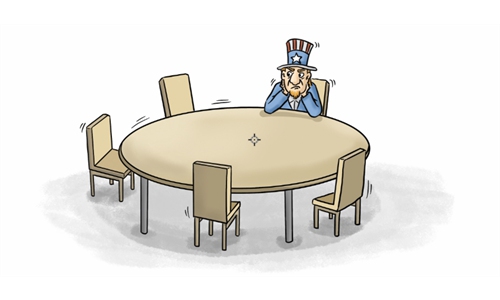US Indo-Pacific Strategy lacks economic pillars, hardly to win hearts in Southeast Asia

Illustration: Chen Xia/GT
US Commerce Secretary Gina Raimondo started her four-day tour through Asia with a visit to Japan on Monday. She will then go to Singapore and Malaysia. According to a press release from the US Department of Commerce, she will "discuss key areas such as supply chain resilience, digital economy and technology, common standards, and supporting regional infrastructure projects."The current US Indo-Pacific Strategy actually stems from the rebalancing Asia strategy of former president Barack Obama. It has been 10 years since the US strategic shift to the East, but there has always been a problem: the lack of economic pillars. In Washington's strategic design, be it the Asia rebalancing or the Indo-Pacific Strategy, it should be composed of multiple pillars including military, diplomatic and economic ones.
The "America First" doctrine has seriously impacted US foreign trade and cooperation. Consequently, countries in the region are generally dissatisfied with the US Indo-Pacific Strategy. The Biden administration has tried to mend this crack. The president participated in the ASEAN summit for first time in four years, and pledged $100 million in funding to advance programs of health, climate, economy and education.
Nonetheless, the US apparently still faces challenges. The Biden administration's push for external economic cooperation is severely limited by a lack of endogenous momentum within the US. Before the outbreak of the COVID-19 pandemic, the world had already slowed down in the development of globalization. The fear for the pandemic has made more and more countries turn inward, including the US. For example, Biden's foreign policy for the middle class and the infrastructure bill signed into law on Monday both signal that the US is focusing more on serving domestic interests.
The priority of the Biden administration is to increase investment and construction in the US to boost its economy and competitiveness, so as to lift its domestic decline. Compared with other diplomatic issues, the domestic social and economic situation is the key to improving people's satisfaction with his presidency. In this context, the Biden administration will focus inward. This means that "Build Back Better World" will give way to "Build Back Better US."
The US Indo-Pacific Strategy is generally designed for winning the great power competition. But regional countries are not willing to turn Southeast Asia into a geopolitical game field. Singapore's Prime Minister Lee Hsien Loong noted that he does not want the region to become a place of competition and conflict, and does not want to be forced to take sides. This represents the aspiration of regional countries, especially ASEAN members: They can carry out economic cooperation with the US, but emphasize more on their strategic autonomy and centrality.
ASEAN values inclusiveness rather than competition. As long as it brings development opportunities, all countries can achieve win-win results in cooperation with ASEAN. This is exactly how China-ASEAN trade relations have developed. China has been ASEAN's largest trading partner for the past 12 years.
It is believed that ASEAN will embrace all kinds of economic agreements that promote regional development, including the Regional Comprehensive Economic Partnership and the Comprehensive and Progressive Trans-Pacific Partnership.
On the contrary, if the US seeks to establish exclusive dominance in the region, check and counterbalance existing cooperation between ASEAN and other countries with the strategic purpose of "great power competition," it will not conform to the norms of ASEAN. Therefore, such a plan will encounter difficulties in the region.
Peace and stability are in the fundamental interests of regional countries. The 2019 ASEAN's Outlook on the Indo-Pacific clearly states that we should avoid a zero-sum game, lead win-win cooperation in the region, and uphold regional peace, stability and prosperity.
After the US, the UK and Australia announced the AUKUS security pact, countries like Indonesia and Malaysia have expressed their concern that such a move would trigger a regional arms race. At the ASEAN-US Summit in late October, Southeast Asian countries underlined that a regional security framework should serve the basic principles of peace and stability.
On the whole, the US' intervention in regional security based on its own interests will further enhance the vigilance of regional countries toward the US Indo-Pacific Strategy. This will also heavily impair the credibility of the US. The weakness of the US' Indo-Pacific Strategy is bound to be difficult to remedy.
Sun Chenghao is adjunct fellow at the Center for International Security and Strategy of Tsinghua University. Wang Jingshu is youth fellow of Project on US and Europe at the same center. opinion@globaltimes.com.cn


